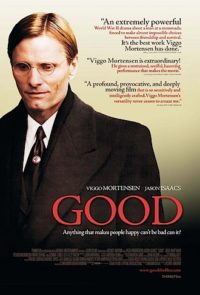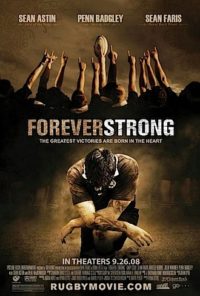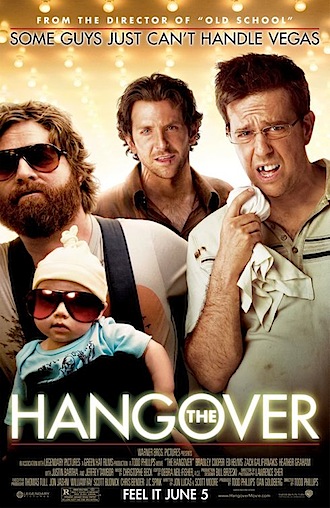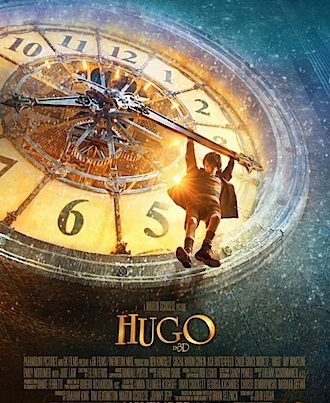 I can just imagine the Monday morning when a development executive stumbled across the script of The Hangover. It wouldn’t have taken him long to realise that he’d discovered modern Hollywood’s holy grail – a perfectly realised men-behaving-badly movie, so well-written and cleverly structured that he wouldn’t need any big stars or a marquee director. By morning tea he would have been gone for the day, safe in the knowledge that his targets for the year were going be met and (no doubt inspired by the script he’d just bought) he would be dropping a big bunch of credit card on hookers and blow. Probably.
I can just imagine the Monday morning when a development executive stumbled across the script of The Hangover. It wouldn’t have taken him long to realise that he’d discovered modern Hollywood’s holy grail – a perfectly realised men-behaving-badly movie, so well-written and cleverly structured that he wouldn’t need any big stars or a marquee director. By morning tea he would have been gone for the day, safe in the knowledge that his targets for the year were going be met and (no doubt inspired by the script he’d just bought) he would be dropping a big bunch of credit card on hookers and blow. Probably.
The script is perfect in its elegant and streamlined construction (screenwriter-porn, no less): Four friends head to Vegas for a bachelor party. We leave them at the first Jägermeister shot, only to rejoin them at dawn as they emerge squinting into the light. They’ve gained a baby and tiger and lost a tooth – and a buddy. The film is all about putting the pieces of the night back together and it’s clever, filthy, loose and charming. The Hangover is indeed the Citizen Kane of all getting-fucked-up-in-Vegas movies – so supremely pre-eminent that (let us hope) we never have to watch another of its kind ever again. Of course, The Hangover 2 is already in pre-production.
 Viggo Mortensen ditches the stubble and takes on the challenging role of a diffident academic in Good, based on a ten year old stage play by CP Taylor. Mortensen is John Halder, a literature professor and novelist struggling with his career and family in pre-WWII Germany. The Nazis are burning books and bullying jews, and Halder’s discussions of mercy killing in an obscure novel brings him to their attention. Flattered, he is slowly absorbed into the Nazi machine, all the while thinking that he is moderating their excesses from within. The film is considered and thoughtful but that also means it is slow and uninvolving.
Viggo Mortensen ditches the stubble and takes on the challenging role of a diffident academic in Good, based on a ten year old stage play by CP Taylor. Mortensen is John Halder, a literature professor and novelist struggling with his career and family in pre-WWII Germany. The Nazis are burning books and bullying jews, and Halder’s discussions of mercy killing in an obscure novel brings him to their attention. Flattered, he is slowly absorbed into the Nazi machine, all the while thinking that he is moderating their excesses from within. The film is considered and thoughtful but that also means it is slow and uninvolving.
 Watching so many films each week, one is often surprised to see the unexpected connections between them. In Good, Viggo Mortensen’s character has an affair with one of his students (Venus’ Jodie Whittaker). On Sunday this was followed by Ben Kingsley’s character in Elegy having an affair with one of his students – the supposedly delectable Penélope Cruz. Based on Philip Roth’s novel “The Dying Animal” (a title which gives rather more of the game away than screenwriter Nicholas Meyer’s version), the film tenderly dissects what happens when a scrupulously independent man finds himself falling in love for real – in the process realising that he has been avoiding genuine connections out of fear rather than principle. Is he too late?
Watching so many films each week, one is often surprised to see the unexpected connections between them. In Good, Viggo Mortensen’s character has an affair with one of his students (Venus’ Jodie Whittaker). On Sunday this was followed by Ben Kingsley’s character in Elegy having an affair with one of his students – the supposedly delectable Penélope Cruz. Based on Philip Roth’s novel “The Dying Animal” (a title which gives rather more of the game away than screenwriter Nicholas Meyer’s version), the film tenderly dissects what happens when a scrupulously independent man finds himself falling in love for real – in the process realising that he has been avoiding genuine connections out of fear rather than principle. Is he too late?
In The Secret Life of Words and My Life Without Me, director Isabel Croixet has been making films about people preparing (consciously and sub-consciously) for death. Elegy mines similar territory but is more about capturing life before the inevitable and it succeeds beautifully. Recommended.
 Elegy also features a moving dysfunctional father-son relationship and, following that on Sunday, in Boy A there was another one. The great Peter Mullan (My Name is Joe, The Claim) plays a social worker preparing a young man for the outside world. “Jack Burridge” has been in detention since he participated in the brutal murder of a young girl when he was a child. Given a new identity in a new town, and coached by Mullan, he ventures out to see if redemption is possible – redemption taking the form of a normal life with jobs, pubs and girlfriends. Beautifully acted by Mullan, Andrew Garfield (as Jack) and Katie Lyons as the woman who falls for him, Boy A is the best film in a very good week and it makes you wonder how the British film industry can put so much time, effort and lottery money into garbage like Sex Lives of the Potato Men when there’s talent like this about.
Elegy also features a moving dysfunctional father-son relationship and, following that on Sunday, in Boy A there was another one. The great Peter Mullan (My Name is Joe, The Claim) plays a social worker preparing a young man for the outside world. “Jack Burridge” has been in detention since he participated in the brutal murder of a young girl when he was a child. Given a new identity in a new town, and coached by Mullan, he ventures out to see if redemption is possible – redemption taking the form of a normal life with jobs, pubs and girlfriends. Beautifully acted by Mullan, Andrew Garfield (as Jack) and Katie Lyons as the woman who falls for him, Boy A is the best film in a very good week and it makes you wonder how the British film industry can put so much time, effort and lottery money into garbage like Sex Lives of the Potato Men when there’s talent like this about.
 Will Ferrell can make pretty much whatever he likes nowadays – if Land of the Lost is anything to go by. A remake of a (supposedly) beloved 70s kids tv show, the adult tone makes it an unwise choice for anyone under 10 and the lack of good jokes make it a poor choice for anyone older than that.
Will Ferrell can make pretty much whatever he likes nowadays – if Land of the Lost is anything to go by. A remake of a (supposedly) beloved 70s kids tv show, the adult tone makes it an unwise choice for anyone under 10 and the lack of good jokes make it a poor choice for anyone older than that.
 Most of the time I’m a fairly easy-going reviewer – there aren’t many films that shouldn’t find some kind of audience somewhere – but every so often you come across something that simply must be destroyed and this week it is Forever Strong, an asinine sporting redemption story about high school rugby in the USA. No clichéd genre is left unturned – sporting, prison, juvenile delinquent, religious tract. The relentless haka-ing and kia kaha-ing with no mention of New Zealand (the ethnic player who leads the hakas appears to be Hawaiian) is just wrong. I wouldn’t even show this in Sunday School.
Most of the time I’m a fairly easy-going reviewer – there aren’t many films that shouldn’t find some kind of audience somewhere – but every so often you come across something that simply must be destroyed and this week it is Forever Strong, an asinine sporting redemption story about high school rugby in the USA. No clichéd genre is left unturned – sporting, prison, juvenile delinquent, religious tract. The relentless haka-ing and kia kaha-ing with no mention of New Zealand (the ethnic player who leads the hakas appears to be Hawaiian) is just wrong. I wouldn’t even show this in Sunday School.
Printed in Wellington’s Capital Times on Wednesday 17 June, 2009. Which seems like an awfully long time ago.
Nature of conflict: Forever Strong is distributed in New Zealand by Arkles Entertainment who I do a little work for now and then.



hey Dan
regarding The Hangover script, according to the LA Times blog, the original spec script,… was a PG-13 type of bachelor-party movie until an uncredited rewrite by director Phillips and Jeremy Garelick (who did The Break-Up) “really pushed the limits”.
credit where it’s due, dude.
I prefer my totally made up version, but thanks for the update.